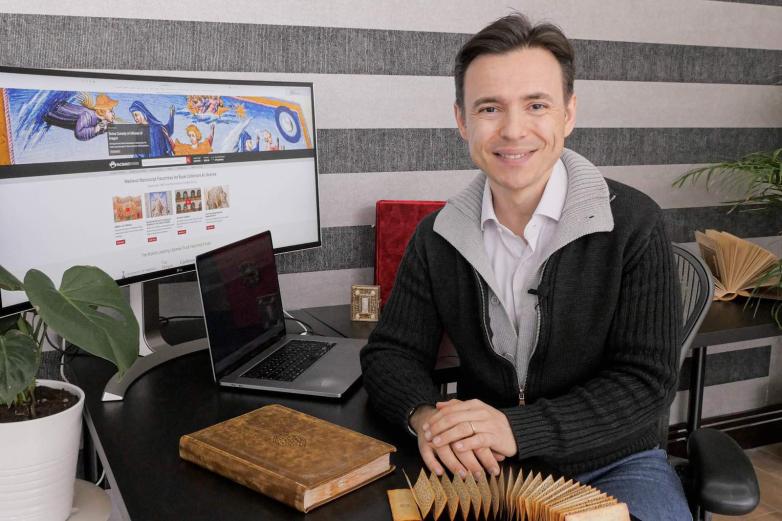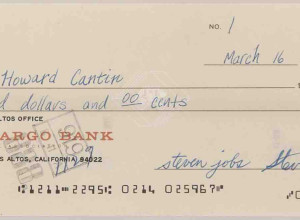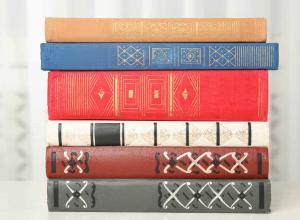What do you love about the book trade?
There are several aspects of the book trade that I genuinely love. Firstly, I feel privileged to work with splendid paper books. The physicality and beauty of these books are an endless source of joy for me. Additionally, I have developed a deep affection for my customers. They possess a wealth of knowledge and have taught me everything I know about the book trade. Working closely with renowned universities such as Princeton, Harvard, and Stanford has allowed me to meet incredible individuals who are experts in book history and trade. Many of them have become dear friends of mine. I haven't invented anything new on my own; I simply applied the knowledge my customers have imparted to me over the years. The constant challenge of the job is another aspect that keeps me engaged. The rapidly changing market necessitates continuous innovation and the generation of fresh ideas. Therefore, we always strive to stay one step ahead.
What is the rare book trade like on the internet?
Engaging with clients through the internet enables us to connect with individuals who are fully aware of their purchase choices and have a strong desire for the selected editions. This aspect is truly beautiful. Although they listen to our suggestions, they are well-informed about the products. On the other hand, the traditional door-to-door sales approach, common in the facsimile trade but not in our work, differs significantly as it often involves convincing people to make a purchase. This type of selling can be more challenging and at times met with skepticism. We consistently strive to meet our clients' needs and offer them the best advice on books, even if it means going against our business interests.
For instance, I once had a client who ordered a facsimile edition I had never seen before. Upon receiving the book from the publisher, I realized that its quality was subpar. Consequently, I informed the client that although the volume was the only way for them to access the desired text, the facsimile itself was not worth the price. As a result, the client canceled the order, and I took the responsibility of returning the book to the publisher. Our strategy has always been to act in the best interest of our clients. If I believe that a particular facsimile is not suitable for someone, I communicate this to them. Through involvement in every phase of facsimile production and marketing, I have acquired in-depth knowledge and expertise, enabling me to provide my customers with accurate advice. This choice may seem counterproductive, but it pays off in the long run.
Do you have a favorite rare book (or ephemera) that you’ve handled?
One of the books I cherish the most is the Parma Ildefonsus (Parma, Biblioteca Palatina, MS Parm. 1650). It was one of the first facsimiles I ever handled and proved to be a great success in sales early in my career. The interlace initials and the gold, silver, and purple decorations in this book are truly priceless. I also hold a deep admiration for Boccaccio's Decameron (Paris, Bibliothèque de l'Arsenal, MS 5070). It never ceases to amaze me with its humorous drolleries and delicate landscapes depicted in its miniatures. This manuscript was once owned by Philip the Good, Duke of Burgundy, similar to another one of my favorite codices, the Book Altar (Vienna, Österreichische Nationalbibliothek, Cod. 1800). This particular codex is a unique combination of a panel diptych and a book. Its pious owner used to pray before it while traveling across his vast realm. Another noteworthy mention is the Codex Aureus of Echternach (Nuremberg, Germanisches Nationalmuseum, Hs. 156142), which features one of the most incredible bindings I have ever seen. Crafted between 985 and 987, this masterpiece incorporates precious ivory, gems, and pearls. It is truly marvelous!
What do you personally collect?
Outside of my work, I have a small collection of unique musical instruments from various countries around the world. Given my passion for music as a drummer and double bass player, I am naturally drawn to collecting musical instruments. One of the most intriguing items in my collection is a modern version of the quijada, a Latin American instrument traditionally crafted from the jawbone of donkeys found deceased in the desert. However, the version I own is made from a combination of metal and wood, offering a contemporary twist. Another remarkable addition to my collection is the axatse, an African percussion instrument renowned for its distinctive and surprisingly loud sound.
What are your thoughts on the present state and/or future of the rare book trade?
Making precise predictions is challenging, but one thing is certain: the rare book market is not threatened by technology. I firmly believe that rare books will continue to be sought after by collectors for centuries to come. Many people still prefer paper books over digital ones, especially for academic and scholarly purposes.
Do you have any upcoming fairs or catalogues?
Fortunately, after the restrictions imposed due to the COVID-19 pandemic, we can now travel again. A few months ago, I was thrilled to attend the Frankfurt Book Fair in person after a two-year hiatus. This fair provides an excellent opportunity for me to connect with major facsimile publishers and stay updated on the latest and upcoming editions. In April of this year, I traveled to Mexico City to participate in the ARLIS/NA (Art Libraries Society of North America) annual conference, and in May, I attended the 58th International Congress on Medieval Studies in Kalamazoo, which is undoubtedly one of our favorite fairs.
In addition to these events, I plan to resume my visits to beloved American universities. Lastly, I have an upcoming trip to Paris, where I have been exceptionally granted access to the vault of the Banque de France, where Leonardo da Vinci's original sketchbooks are treasured. A facsimile edition of this incredible set of manuscripts will soon be published, and my journey to France is part of my role as a facsimile production consultant.
What do you like to do outside of work?
In addition to my passion for music and technology, I am a great admirer of craftsmanship and occasionally enjoy woodworking. Recently, I acquired a laser engraver for the office, which allows me to create and personalize small wooden objects. Towards the end of last year, we chose a wooden letter opener (which also functions as a bookmark) as a gift for our clients. I used my new machine to engrave each letter opener with the names of the clients, making each one unique. It was truly fulfilling!




















